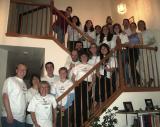|
|
Tools and Resources Major
resources for the qualitative projects include 2 texts as case examples
and 2 textbooks with different approaches to education research: Holland,
D.C. & Eisenhart, M.A. (1990). Educated in Romance: Women,
Achievement and College Culture. Chicago: University of Chicago Press.
(anthropological example)Lareau,
A. (2003). Unequal Childhoods: Class, Race and Family Life. Berkeley:
University of California Press. (sociological example)Creswell,
J.W. (2004). Educational Research: Planning, Conducting, and Evaluating
Quantitative and Qualitative Research. Second Edition. Upper Saddle
River, NJ: Merrill Prentice Hall. (educational research approach)Maxwell,
J.A. (2005). Qualitative research design: An interactive approach.
Second Edition. Thousand Oaks, CA: Sage Publications. (anthropological
approach)
Creswell on the web
|
|
|
|
Goals for Students To design and conduct a qualitative research project To design and conduct a quantitative research project To design and conduct a mixed methods research project
|
|
|
Program Context Most of our students enter without backgrounds in research. As former teachers, some are skeptical of the value of education research. We do not have the resources to enable every student to work on a funded research project. By
inducting first-year students into the culture of research from the
start and as a cohort, we hope to establish a strong research
foundation for their advanced specialty area work and their
dissertations. During
their second and third years of coursework, students complete
additional supervised research projects in their advanced courses. One
or more of these projects may be directly related to the dissertation
topic. By the end of the third year, students should be ready to write
a dissertation prospectus, receive approval for the dissertation, and
begin the dissertation research. From this point on, students meet
regularly with their faculty advisors to discuss their progress. As
students complete drafts of their dissertation chapters, the chapters
are reviewed by advisors and other committee members as needed. A
student's defense of the dissertation is scheduled when a full draft is
completed.
|
|

The First Cohort, 2004-05
|
Reflections Angela Eckhoff, Educational Psychology (EPSY) "Prior
to entering the program at the University of Colorado at Boulder, I had
primarily been exposed to traditional quantitative research
methodologies. Once in my program, I had the opportunity to learn more
about both qualitative and quantitative methodologies through the...
coursework offered in the School of Education.... In my own research,
I've utilized methodologies such as classroom observation, surveys,
interviews, and randomized experimental trials. I believe that the use
of multiple methodologies has enabled me to explore interesting
research questions to a degree not possible if I were to retain a
singular methodology focus. The exposure I've gained from the School of
Education to multiple methodologies has been one of the most positive
aspects of my experiences in the doctoral program at CU. "
|
|
|
|
How Do We Know? Project
design and activities are scheduled topics in each Year 1 course and
coordinated across the courses. Project design components (how to
identify a research question, how to develop a conceptual framework,
how to think about the match between research questions and research
methods) are assigned, reviewed by an instructor, revised and graded
throughout the year. Project activities (collecting and writing
fieldnotes, constructing statistical measures, using analysis
techniques) are assigned, reviewed, revised and graded throughout the
year. At the end of the year students present their completed projects in poster sessions for the School of Education.
Example: Standards for Evaluating Qualitative Research Projects
|
|
|
Unanswered Questions Are 2 research projects in the first year too much? How should the advanced specialty area courses change so they build constructively on the Year 1 core? Should all students expect to take more research methods courses, and if so, which ones? What other research opportunities (outside of coursework) should be provided for students? In what ways should comprehensive exams be changed in light of the core?
|
|
|
Contact Information Contact person(s): Dr. Margaret Eisenhart Email address: margaret.eisenhart@colorado.edu
Eisenhart webpage
|
|
|